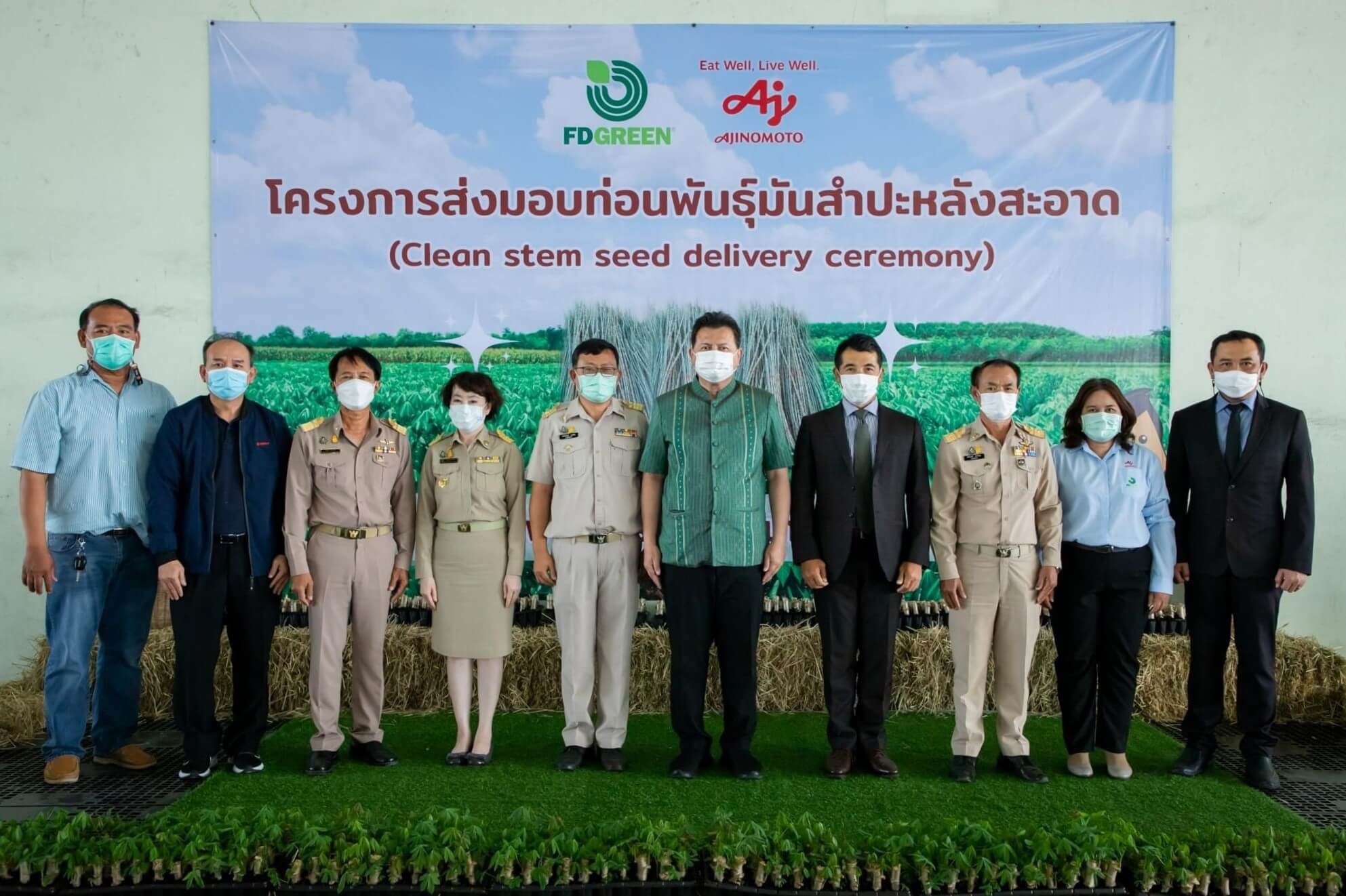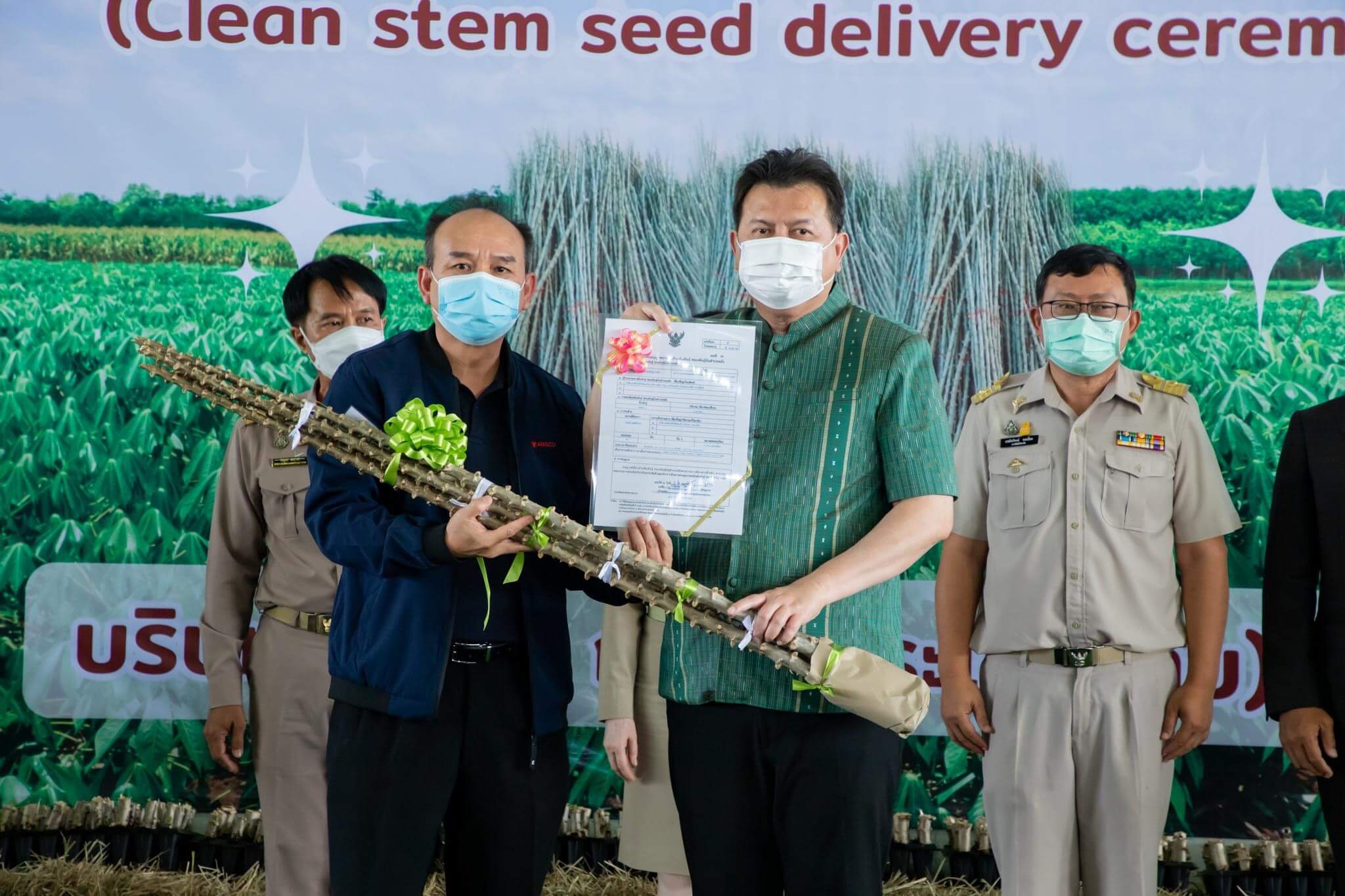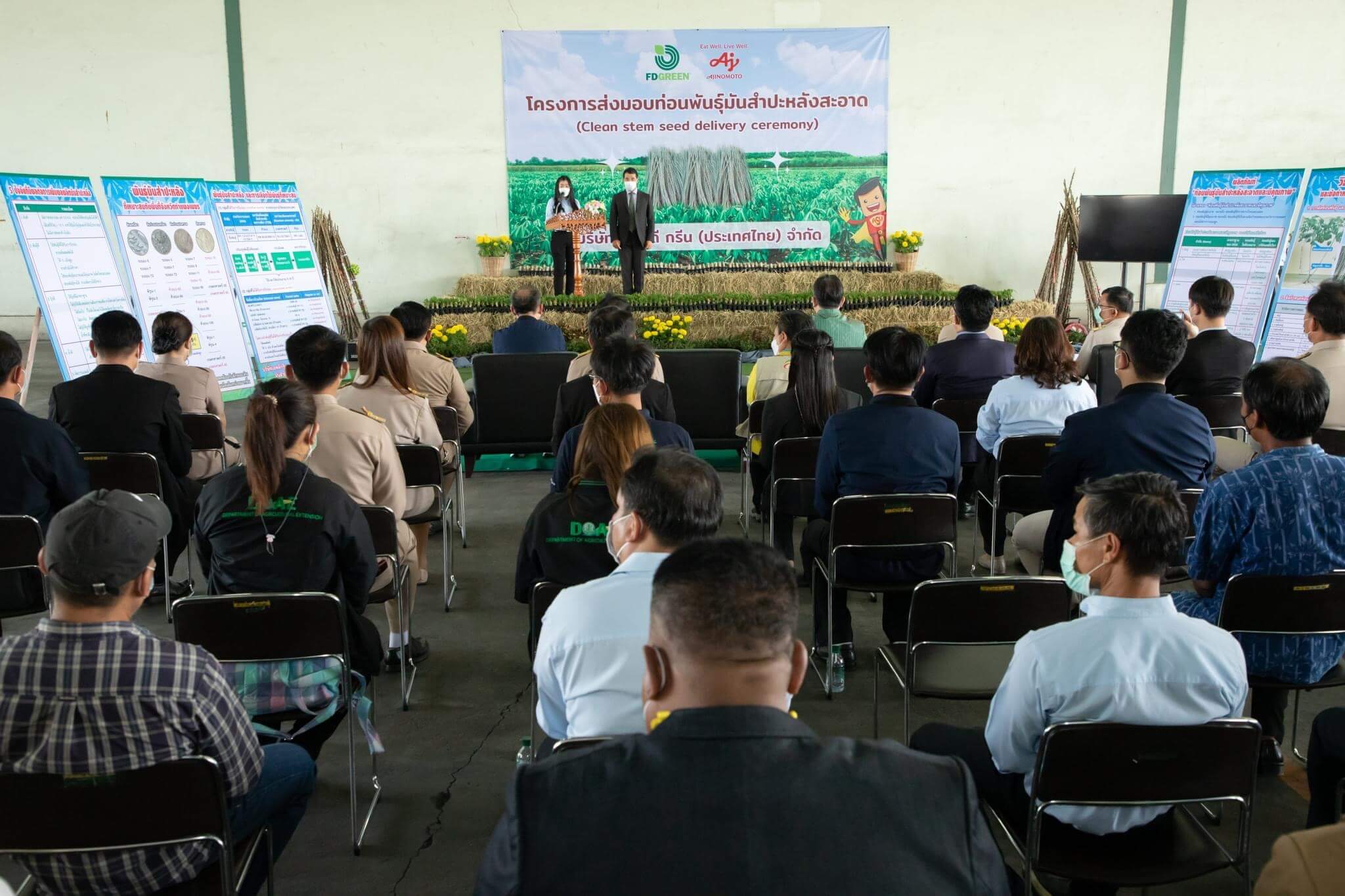Ajinomoto develops clean and Mosaic Disease-free cassava stems, aiming to promote the sustainable productivity of Thai farmers

Ajinomoto aims to support sustainable development of the agricultural sector through various integration activities to "help solve problems and lift up better livings for Thai agriculturists", especially cassava farmers, which is the key producer delivering "main raw materials" to the production process of the Ajinomoto Group’s products. This is in accordance with the company's policy, "The Ajinomoto Group Creating Shared Value (ASV)", that we adhere to continuously operating through all business activities.
Recently, FD Green (Thailand) Co., Ltd., a subsidiary of Ajinomoto Co., (Thailand) Ltd., has successfully developed the preparation of clean and Mosaic Disease-free cassava stems that will effectively reduce risk and prevent the spread of cassava Mosaic disease in Thailand. The company has delivered the qualified cassava stems to Asia Modified Starch Co., Ltd. and to King Mongkut’s University of Technology Thonburi (Ratchaburi Learning Park) in the amounts of 6,700 stems and 1,260 stems, respectively, to test the effectiveness in this year and to further distribute to farmers in next year, which is expected to help farmers for more than 161 families to have high-quality cassava stems that can be used in their cultivation, covering an area of approximately 1,088 rai. This will be an important part of elevating the sustainable cultivation of Thai farmers while boosting productivity through the use of clean and high-quality cassava stems.
From the current information disclosure, it was found that “cassava is one of the country’s economic crops, which Thailand has exported as the third largest in the world and generates income around 100 billion baht annually", but due to Cassava Mosaic Disease, the amount of productivity is lower than expected by more than 20–80% per year. It also increases the cost for farmers to find new disease-free stems to be used to plant new cassava in the next round of planting.
The company believes that this project will improve the quality of life of Thai farmers by enabling them to grow more cassava without being affected by the pandemic cassava virus and lowering the cost of finding new cassava stems to replace the infected stems, which will increase farmers' income. Additionally, this execution can help reduce the problem of food waste from the loss of infected cassava production. This is aligned with our ambition to “uphold global sustainability” for the better quality of life of people worldwide.


Relate Links

Sustainability Field Trip for CEO Members 2023 (Care Earth Organization; The Synergy for Sustainability Task Force Team)

Ajinomoto continuously drives the business towards sustainability along with reinforces intention to create a circular economy for plastics with EPR Principles in Sustainability Expo (SX 2023)

ส่งซอง “รสดี” ลุ้นเป็นเศรษฐีทุกคน
ส่งซอง “รสดี” ลุ้นเป็นเศรษฐีทุกคน ลุ้นโชคทองง่าย ๆ แค่ 3 ขั้นตอน

Ajinomoto launches “Life is Full of Amino Acids” campaign to educate Thais about amino acids and their health benefits

Ajinomoto introduces ‘AminoMOF’ to tap into the thriving 10-billion-baht market for elderly dietary supplements meeting the needs of over four million Thai seniors seeking improved fitness and mobility with confidence

Birdy Black Zero Coffee wins 2023 BASES Top Breakthrough Innovations Awards in Thailand awarded by Nielsen.

Ajinomoto is transforming its business focus Shaping the Future to Become a Leader in Sustainable Well-Being for Thai Society Supporting all life stages for a healthy aging society and enhancing environmental sustainability for consumers

เปิดตัวน้องใหม่ ขนาด 50 กรัม แพ็ครักษ์โลก
บริษัท อายิโนะโมะโต๊ะ (ประเทศไทย) จำกัด รุกตลาดผลิตภัณฑ์ในกลุ่มเครื่องปรุงรส ด้วยการเปิดตัวแพ็คเกจจิ้งใหม่ “อายิโนะโมะโต๊ะ ขนาด 50 กรัม” เจาะกลุ่มผู้บริโภครุ่นใหม่ ชูจุดเด่น อร่อย รักษ์โลก พร้อมทั้งมีช่วยในการสร้างความยั่งยืนให้กับโลก

Ajinomoto joins forces with Yuthasar Na Nagara Foundation and Thailand Management Association (TMA) to support the knowledge of sustainability creation for students under the “Chicken Run Camp for Young Business Leaders : ESG 2023” project

Ajinomoto is awarded the 2023 "Green Industry Level 4", emphasizing our dedication to driving the organization toward a sustainable green culture

Ajinomoto receives honorary plaque of sustainably contributing to Thai society from PPAT
Ajinomoto receives honorary plaque of sustainably contributing to Thai society from the Provincial Press Association of Thailand (PPAT)

Ajinomoto receives the 2023 3Rs Award under the Zero Waste to Landfill project, striving to achieve the goal of zero waste landfilling in all establishments

Ajinomoto congratulates Thai Badminton athletes through Victory Day activity
Ajinomoto warmly welcomed Thai Badminton athletes to Victory Day activity which was held to extend congratulations as they won in competition of SEA GAMES 2023 and to encourage for the next victory of upcoming ASIAN Games 2023 in this September

Ajinomoto announces ‘the intention to deliver Healthy Living Society to Thais’ in 2023 Customer Thank You Party

Ajinomoto Co., (Thailand) Ltd., led by Sustainability Promotion and Environment Team attended the mangrove reforestation activity in collaboration with Thailand Business Council for Sustainable Development (TBCSD)

“Birdy®”, one of variety products under Ajinomoto Co., (Thailand) Ltd., reinforces itself as the top market leader of RTD canned coffee in Thailand delivering quality product while promoting Healthy Living society to Thai people guaranteed by the award of

อายิโนะโมะโต๊ะ ร่วมเวทีขับเคลื่อนความสัมพันธ์ สร้างเครือข่ายธุรกิจไทย-ญี่ปุ่น ในงาน Thailand-Japan Economic Forum 2023 2023 ภายใต้แนวคิดทิศทางในอนาคตของการสร้างสรรค์ร่วมกันในด้านเศรษฐกิจระหว่างประเทศญี่ปุ่นและประเทศไทย

Ajinomoto sets nutrition training integrating AminoScience to enhance strength for Thai national athletes to prepare themselves for the 25th Asian Athletics Championships Asian Athletics Championships 2023

Ajinomoto joins forces with ABC Cooking Studio to conduct cooking class with delicious salt reduction concept!

Ajinomoto supports National Athletics Athlete through applying AminoScience
Ajinomoto supports National Athletics Athlete through applying AminoScience delivering aminoVITAL®, worth 360,000 Baht to Athletics Association of Thailand
![Ajinomoto driving the business towards sustainability in Thai society together with TBCSD Members on Eco-friendly business field trip [TBCSD Trip]](https://www.ajinomoto.co.th/img/space/img-410x230-space.png)
Ajinomoto Co., (Thailand) Ltd., led by Mr. Sornchai Kusonjai, Director, together with Mr. Sireethus Saovaro, Sustainability Promotion Department Manage

Introduction of Sustainability for Ajinomoto factories
Ajinomoto Co., (Thailand) Ltd., responds to the Ajinomoto Group’s policy in striving to work to reduce environmental impacts by adhering Green Technology for better Earth Partner as a framework driven through all business activities in every establishment

Until recently, the focus of eco-friendly procurement has mainly been focused on environmental aspects. Also known as "green sourcing" and green procurement, this movement seeks to substitute one material for a more ecologically friendly alternative.

Ajinomoto supports nutrition program applying ‘AminoScience’ promoting Badminton athletes’ efficiency to be ready for national competition

Ajinomoto joins hands with health alliances to promote healthy consumption behavior and good health for Thais

เหตุผลที่รางวัลสำนักงานสีเขียวเป็นรางวัลแห่งความภาคภูมิใจขององค์กรที่ใส่ใจสิ่งแวดล้อม

Ajinomoto Young Chef Thailand Competition Winners Announced Thailand’s first less-sodium food creation contest to highlight the talents of new generation chefs who are health-conscious and motivated to build a sustainable society

Birdy® brand cares for the Earth by reducing plastic waste and food waste for a sustainable environment
